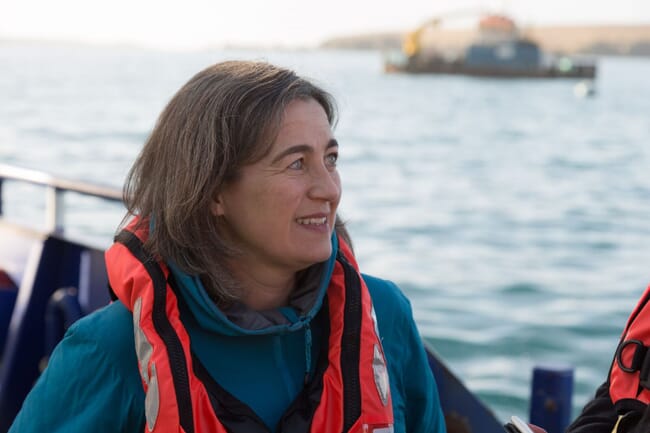Scottish salmon exports to the EU do not need Export Health Certificates (EHCs) at the moment because of free movement of goods within the EU.
However, it now appears inevitable that these exports will need EHCs after the end of 2020, when the transition phase is over, because of the UK government’s decision not to align with EU regulations in the future.
In financial terms, the cost of this for Scottish farmed salmon will be between £1.3 million and £8.7 million per year, depending on the amount charged by councils for each EHC and the number of EHCs required per lorry load.
In bureaucratic terms, it could mean the processing and signing of an extra 50,000 to 100,000 EHCs every year, each one of which has to be signed by either an environmental health officer or a vet.
This will need extra staff at the main haulage distribution hub, the DFDS base at Larkhall in South Lanarkshire, and delays and hold ups in the dispatch of salmon to the continent.

Julie Hesketh-Laird, chief executive of the Scottish Salmon Producers Organisation (SSPO), said: “Scottish farmed salmon is the UK’s biggest food export.
“We now send more than £190 million worth of salmon to France, a third of our total exports. Once in the main French markets, the salmon can then be dispatched to almost anywhere in the EU.
“We deal in a perishable product so it is crucial for the thousands of loyal customers we have in the EU that we get our fresh fish to key markets as quickly and smoothly as possible.”
Ms Hesketh-Laird added: “The addition of an Export Health Certificate for every order of salmon to the EU would place huge unnecessary financial and bureaucratic burdens on our sector – potentially undermining one of the UK’s biggest modern export success stories.
“About 300 salmon orders are dispatched to the EU every day by road and through the Channel Tunnel. If each one – or even each lorry load – had to have an extra certificate, signed by a vet or an environmental health officer, it would not only add delays and cost to Scottish salmon exports, it would give our international competitors an advantage they would be unlikely to pass up.
“We are appealing to the UK government to make this a priority in negotiations with the EU.
“We want both sides to commit to allow seafood trade to the EU to continue as it now, without the imposition of any new tariff or non-tariff barriers and we want UK ministers to call for this in negotiations.”
SSPO’s requests
- Stay aligned with the EU on seafood exports after the end of the transition period so no EHCs will be needed.
- Make the transport of seafood to the EU without EHCs a key condition in negotiations over the future trading arrangement between the UK and the EU.
- Accelerate the process, already started by the UK Animal and Plant Health Agency, to digitalise the EHC process, making it swifter and simpler.
- Negotiate for the continued tariff-free access to the EU for Scottish salmon after the end of the transition period.


